Understanding what cats go through when they are pregnant will help you to take much better care of them as their pregnancy progresses and they give birth.
This article aims to help you undersant your cats pregnancy better.
Contents
How To Tell If Your Cat Is Pregnant
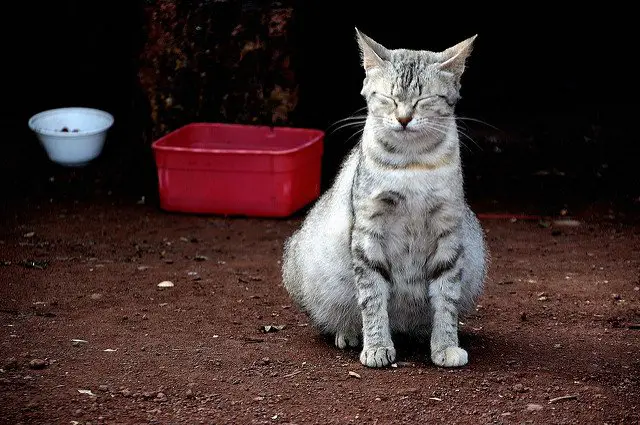
If you’re asking this question then it is likely that either your (unsnipped) cat has sneaked out of the house leaving you worried that she has had an encounter with a tom cat that could have left her pregnant or you are proactively encouraging your cats to have kittens.
If you are unfamiliar with feline pregnancy then it may not be initially obvious if your cat is pregnant however there are plenty of signs to watch out for which will make it clear.
If you’re not sure when your cat is due use our cat pregnancy calculator to work out her due date.
Early Signs Of Cat Pregnancy
Heat Cycle Cessation
If you are concerned that your cat may be pregnant then you should pay close attention to their heat cycles. A typical heat cycle lasts three weeks altogether and your cat can be in heat between one and seven days within a cycle.
When a cat is in heat their vulva will appear red and swollen and may bleed.
It is important to get familiar with your cat’s heat cycle so that you are aware of any changes, such as the cycle stopping altogether, which is a strong indicator that your cat is pregnant.
Larger & Darker Nipples
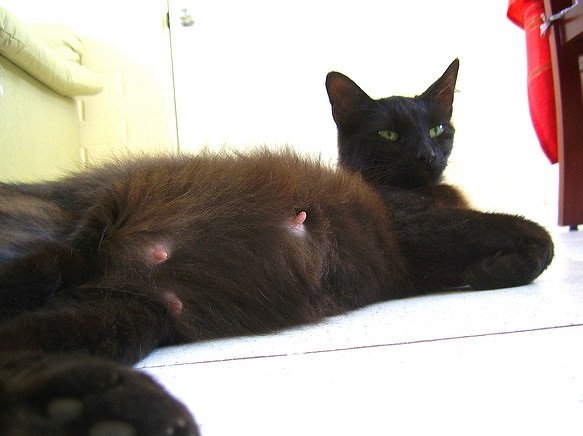
Early on in your cat’s pregnancy their nipples will change. They will become larger and appear swollen, the colour of the nipple will also change to more vivid pink. These change typically occur around three weeks into the pregnancy at this stage no milk will have been produced however your cat’s body is gearing up for milk production.
Later Signs of Cat Pregnancy
Engorged Stomach
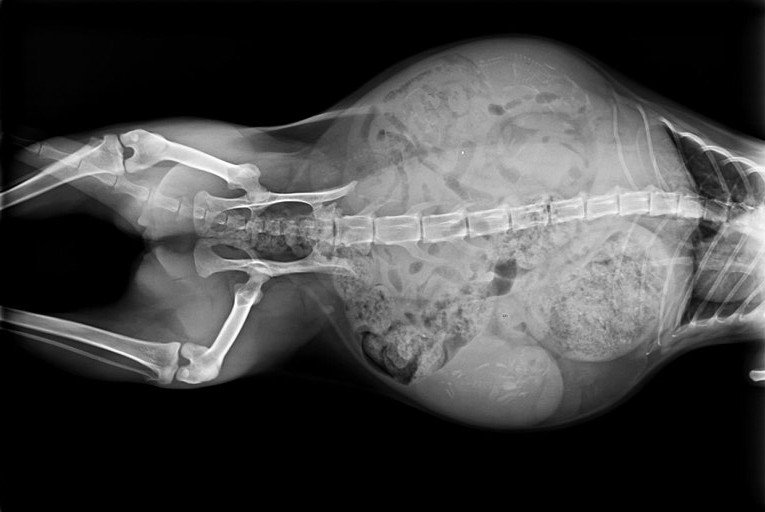
It is not until fairly late in your cats pregnancy that their stomach will become noticeably larger. As the kittens grow in the womb your cats belly will grow and expand, however it is not until around the fifth week of your cat’s pregnancy that the cats belly will drop downwards giving your cat an obviously distended stomach.
In some cats it may be harder to tell if your cat has a particularly swollen stomach, it can be hard to tell if your cat has a lot of fluffy hair which may cover their stomach, they are quite fat cats, they have had a litter of kittens previously (as this can cause stretching if the stomach so that it will naturally drop down more), if they are just carrying one kitten their stomach will be significantly less distended than if they are carrying a large litter.
Pregnant Cat Behaviour
When your cat is pregnant their behaviour will change in some subtle ways and some not so subtle ways, a few things to watch out for are mentioned below.
Vomiting
Vomiting in pregnant cats is not uncommon. As with human pregnancies cats also suffer from morning sickness, this will typically be most prevalent around the fourth or fifth week of the pregnancy.
It is important to be aware that if your cat is vomiting in the last (ninth) week this could be a sign that labour is about to start. This vomiting should last no more than one day however if it does last longer than this you should immediately take your cat to the vet.
Frequent vomiting for longer than 24 hours immediately before birth is due indicates that there may be problems with the pregnancy such as having a kitten stuck in the cervix or a your cat may have a nasty infection.
Nesting
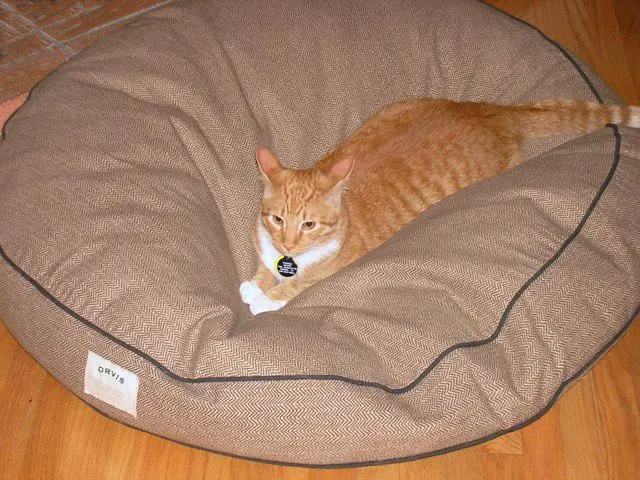
Nesting is when your cat starts searching for an ideal place to give birth to her kittens. This will usually be a calm, quiet and comfortable area with low light which feels safe and out of the way, cats often choose cupboards for giving birth in.
When your cat starts nesting this is a sign that labour is imminent and you can expect the kittens to arrive within two days or less!
What Age Can Cats Get Pregnant?
Cats can get pregnant when they are only four months old and are still kittens themselves, this means they would give birth at the young age of only six months!
To avoid kitten pregnancies you should ensure that your kittens are spayed by three months old at the latest (there have even been stories of some kittens getting pregnant at just two months old so earlier is better!). Kittens are big enough to safely have the spaying operation when the reach the age of two months.
How Long Are Cats Pregnant For?
The gestation period for cats lasts between 63-70 days (just over two months).
It is unusual for cats last ten weeks without giving birth however some cats, particularly oriental breeds, have longer than average pregnancies. If, by the end of the tenth week of pregnancy, there are still no sign of any kittens then it is important that you consult your vet as intervention may be required.
Cat Labour Signs
As your cat gets closer to giving birth there will be subtle changes in their behaviour. For example if you cat is typically a very affectionate cat you may find that they become quite withdrawn as birth approaches, or conversely a usually withdrawn cat may suddenly start seeking your affection a lot more as the birthing hormones start to kick in.
Your cat may also stop eating completely in the day or two before labour begins so keep a close eye on their food bowl to keep track of this warning sign.
Your cat will also begin washing their genital area very frequently, this help stimulate the onset of labour and may also be accompanied by a discharge.
Preparing For Kittens To Be Born
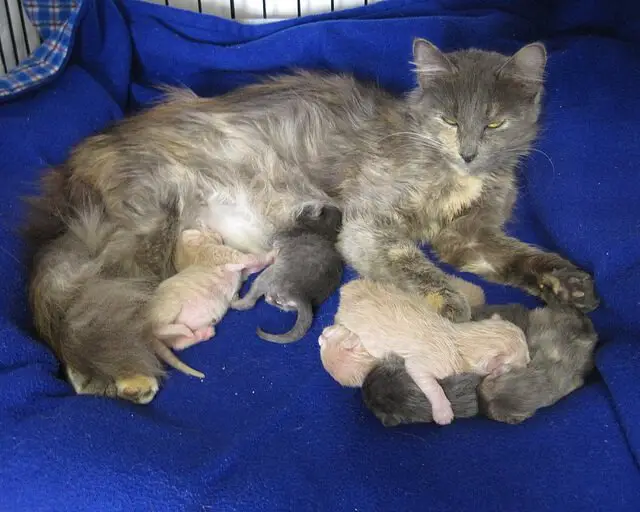
To ensure that you are ready for kittens in your home make sure that you have plenty of blankets around which you don’t mind getting dirty (think blood and kitten faeces).
You should also make sure that any potentially dangerous items such as electricals, sharps, anything made of glass or precariously placed ornaments that could topple as well as all plants (as some can be poisonous to cats, more so to very young kittens) are all removed from the room that your cat is nesting in, this will reduce any danger to the kittens.
You should also get a large cat carry box to hand in case you need to take your cat and it’s litter to the vets following the birth if they are any problems.
We hope you enjoy your kittens, find out here what to expect as your kittens grow.
As an Amazon Associate I may earn a small fee from qualifying purchases at no extra cost to you. This helps us run the site, so thanks for your support!

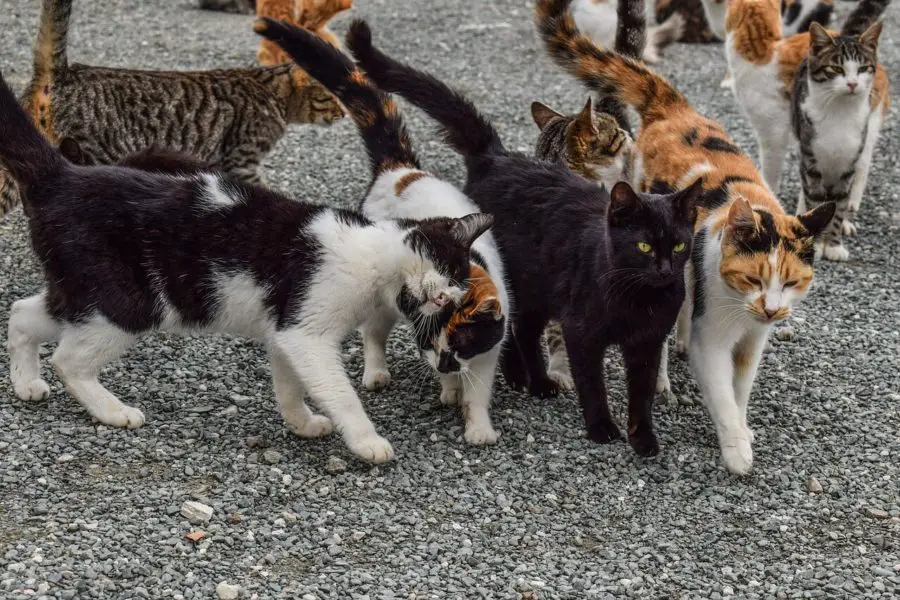
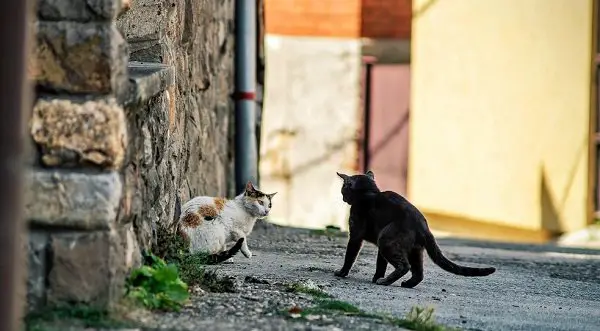
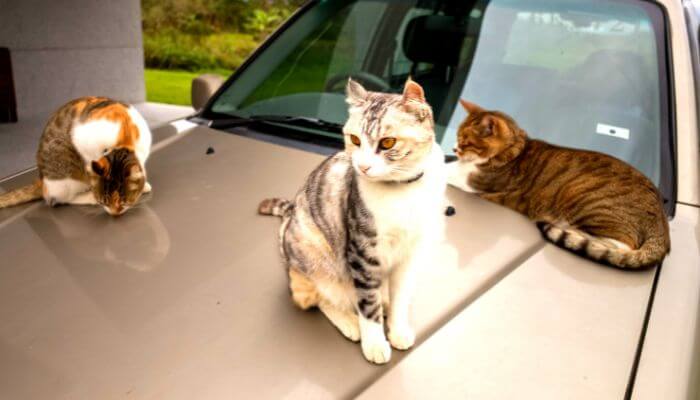
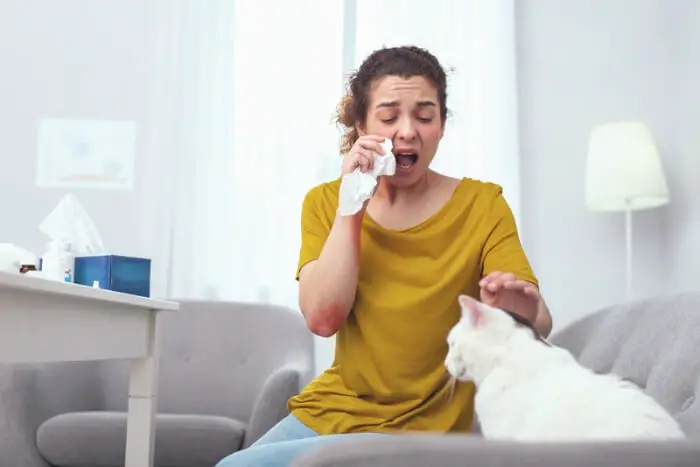


Hiya
My cat Topsy is now pregnant (woo!) and we have been wondering what can we feed her / do with her to make sure her pregnancy goes smoothly. Do you have any recommendation on supplements etc so that we have a stress free and healthy mumma and kitties come her due date?
TIA – Heather x
Hey Heather,
first of all congratulations!
Second of all my top tip would be to cut out the carbs, cats don’t really need carbs in their diet and can struggle to digest them, so it is best to avoid them altogether when your cat is pregnant by feeding them grain free cat food which is full of healthy fishy oils. Other than that I would generally avoid giving your cat any supplements during pregnancy unless your vet has stated that you specifically need to do so.
We hope it goes well!